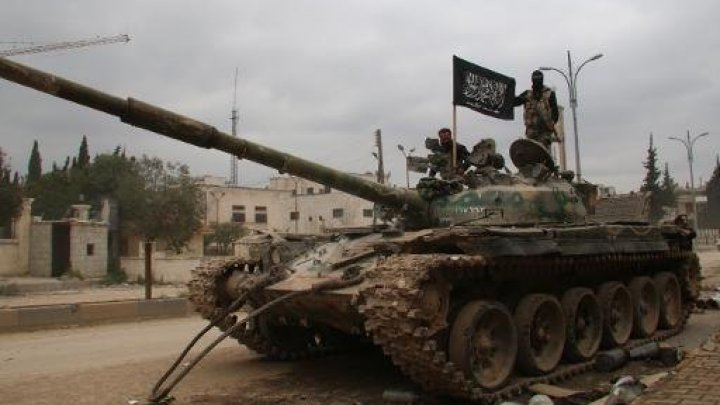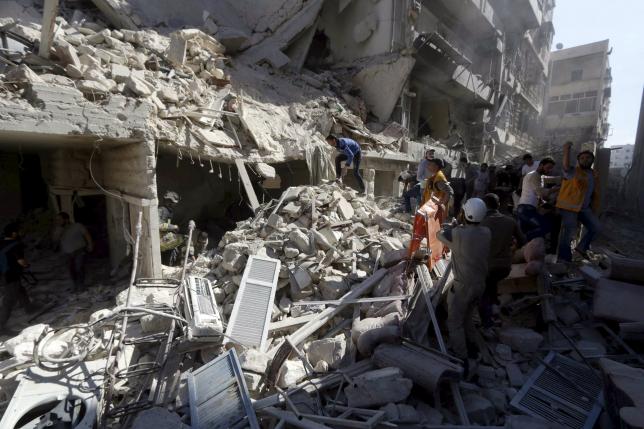www.aljazeerah.info
News, May 2015
Archives
Mission & Name
Conflict Terminology
Editorials
Gaza Holocaust
Gulf War
Isdood
Islam
News
News Photos
Opinion Editorials
US Foreign Policy (Dr. El-Najjar's Articles)
www.aljazeerah.info
|
Editorial Note: The following news reports are summaries from original sources. They may also include corrections of Arabic names and political terminology. Comments are in parentheses. |
Syrian Rebels Battle Army Near Assad Latakia Heartland
May 5, 2015
 |
 |
| Al-Nusra Fighters near Idlib | Aleppo neighborhood destroyed by a government barrel bomb |
Syrian rebels battle army near Assad heartland
France 24, 2015-05-01
Islamist rebels and Syrian army troops on Thursday were engaged in heavy fighting in Syria’s northwestern Latakia province in areas close to President Bashar al Assad’s ancestral home, the army and rebels said.
An army source told state news agency SANA fighter jets hit insurgent hideouts in the northern Latakia countryside with “tens killed and injured.”
Rebels have in the past sought to bring their four-year-long battle to topple Assad’s rule close to the coastal areas in government-held Latakia, the stronghold of Assad’s minority Alawite sect.
Latakia is the main port in Syria and crucial to the rebels goal of toppling Assad’s government. Two rebel sources said the fighting was near the mountains of Jabal al-Akrad, close to some of the highest peaks in Syria including Nabi Younis that overlook Alawite villages and close to Qardaha, the hometown of the Assad family.
“The capture of the peaks would make the Alawite villages in our firing range,” said one rebel field commander from Ahrar al Sham based in Idlib on Skpye.
Insurgents have captured strategic territory in the South and in northwestern Idlib province, where they have edged closer to Latakia.
In August 2013, Islamist rebels helped by foreign fighters were able to briefly capture villages populated by Assad’s Alawite minority.
Diplomats say rebels are trying to pressure the overstretched army on as many fronts as possible to force the overtaxed military to spread its resources ever more thinly.
Al Qaeda-linked Nusra Front seizes key Syrian town
France 24, 2015-04-25
Al-Qaeda's Syrian affiliate and its allies seized the last major government-held city in Idlib province on Saturday, in a blow that could expose the regime's coastal heartland to rebel attack.
The capture of Jisr al-Shughur in the northwestern province comes nearly a month after the same coalition of opposition forces, known as the "Army of Conquest", overran the provincial capital.
The city's fall opens up a strategic assault route for the rebels to neighbouring Latakia province on the Mediterranean coast, a bastion of President Bashar al-Assad's regime, analysts said.
"(Al-Qaeda affiliate) Al-Nusra Front and the Islamist brigades now have complete control of Jisr al-Shughur," Syrian Observatory for Human Rights chief Rami Abdel Rahman told AFP.
"There are some ongoing battles outside the city, to the south and east."
The Britain-based monitoring group said the bodies of at least 60 regime loyalists had been seen on the streets of the city, which was overrun by thousands of rebels.
In the wake of the capture, the Observatory said government planes carried out at least 30 air strikes on and around the city.
"At least 10 people have been killed in the city in the strikes, both civilians and fighters, and dozens more are injured, with the toll expected to rise," Abdel Rahman said.
'23 prisoners executed'
The Observatory also reported that government forces summarily executed at least 23 prisoners in a detention facility before they withdrew.
State media did not acknowledge the city's fall, saying only that "units from our valiant army successfully redeployed on the outskirts of Jisr al-Shughur to avoid casualties among innocent civilians".
State news agency SANA said "aircraft bombed groups of terrorists in the Jisr al-Shughur region, and destroyed dozens of military vehicles and killed terrorists".
The jihadists hailed victory on their official Twitter account.
"The mujahedeen have entered the city centre. The city has been liberated," Al-Nusra said.
One of the group's official accounts published multiple photographs of Al-Nusra fighters in the city, some holding their black flag and others reciting "prayers of thanks" for the city's capture.
It also published a photo of some of the prisoners reportedly executed by government forces, showing at least 14 bodies, some piled on top of one another, in a room with blood-smeared walls.
Jisr al-Shughur became the regime's de facto provincial capital after the Army of Conquest coalition overran Idlib city last month.
With the loss of Jisr al-Shughur, the regime holds only a few areas in the east of the province, including the town of Ariha, a military base in Al-Mastumah and an air base at Abu Duhur.
Assad heartland exposed
But an activist from Idlib told AFP that both Ariha and the Al-Mastumah base were now under rebel siege, along with another military base called Al-Qarmid.
While last month's capture of Idlib city was hailed by many in the opposition because it was only the second provincial capital entirely lost by the regime, the seizure of Jisr al-Shughur may prove to be strategically more important.
"This city is more important than Idlib city because it is close to Latakia province and regions controlled by the regime in the northeast part of Hama province," Abdel Rahman said.
It lies on the road leading to the regime's Latakia bastion, and is also close to the border with Turkey, which is a leading backer of the uprising against Assad.
"For the opposition as a whole, it would open up the route into Latakia from Idlib and Hama, which could significantly enhance any future offensive on Latakia," said Charles Lister, a visiting fellow at Brookings Doha Centre and a Syria specialist.
"That would be very dangerous for the regime."
He said the capture could also pose a new threat to the regime in neighbouring Aleppo province, which lies to the east of Idlib.
"At the end of the day, this needs to be seen as more than just an offensive on Jisr al-Shughur, there's a much bigger strategy playing out."
(AFP)
Syrian barrel bomb attacks are 'crimes against humanity': Amnesty
By Kieran Guilbert
Tue May 5, 2015 8:35am EDT
Residents and Civil Defence members look for survivors at a damaged site after what activists said was a barrel bomb dropped by forces loyal to Syria's President Bashar al-Assad and hit a school and a residential building in Seif al-Dawla neighborhood of Aleppo May 3, 2015. Reuters/Hosam Katan
LONDON (Thomson Reuters Foundation) - Syrian government forces are targeting civilians in barrel bomb attacks in Aleppo that have forced hospitals and schools to move underground, Amnesty International said on Tuesday, describing the bombings as "crimes against humanity".
Barrel bombs -- containers packed with explosives and projectiles that are dropped from helicopters -- killed some 3,000 civilians in the northern Aleppo governorate last year, and have killed more than 11,000 in Syria since 2012, Amnesty said.
"I saw children without heads, body parts everywhere ... it was how I imagine hell to be," one factory worker told Amnesty in a report.
Another resident said the streets had been filled with blood and described Syria's second city as "the circle of hell".
Rights groups have long raised concerns about barrel bombs, and the U.N. Security Council adopted a resolution early last year condemning their use in populated areas, threatening "further steps" in the case of non-compliance.
Syrian President Bashar al-Assad said in February that the Syrian air force did not use barrel bombs. U.S. and European officials have said Assad's denial is not credible.
Aleppo, near the Turkish border, is a major frontline in the Syrian war.
"Sheer terror and unbearable suffering has forced many civilians in Aleppo to eke out an existence underground to escape the relentless aerial bombardment of opposition-held areas by government forces," Amnesty said in the report.
Syria's four-year-old civil war began in 2011 when a government crackdown on a pro-democracy movement led to an armed uprising. Islamic State militants have taken advantage of the chaos to declare a caliphate in a swathe of Syria and Iraq.
The conflict has killed more than 220,000 people in Syria and uprooted some 7.6 million within the country. Nearly 4 million have fled to nearby countries.
"SPIRAL OF ABUSES"
Government attacks using barrel bombs and other imprecise explosive weapons have targeted heavily-populated residential areas, including markets, transport hubs, mosques, hospitals, medical centers and schools, according to Amnesty.
Armed opposition groups have also committed war crimes by using imprecise weapons such as mortars and improvised rockets fitted with gas canisters called "hell cannons" in attacks that killed at least 600 civilians in 2014, the rights group said.
The report also said torture, arbitrary detention and abduction of civilians in Aleppo by both sides was widespread.
Attacks from government and rebel forces have left civilians in Aleppo living in dire conditions, lacking basic supplies including food, medicine, water and electricity, and have hampered efforts to provide humanitarian aid, Amnesty said.
"The international community has turned its back on Aleppo's civilians in a cold-hearted display of indifference to an escalating human tragedy," Amnesty's Middle East and North Africa program director Philip Luther said in a statement.
"Continued inaction is being interpreted by perpetrators of war crimes and crimes against humanity as a sign they can continue to hold the civilians of Aleppo hostage without fear of any retribution."
The Syrian conflict should be referred to the International Criminal Court to bring the perpetrators to justice and help "stem the spiral of abuses", he added.
(Reporting By Kieran Guilbert, editing by Emma Batha)
***
Share this article with your facebook friendsFair Use Notice
This site contains copyrighted material the
use of which has not always been specifically authorized by the copyright
owner. We are making such material available in our efforts to advance
understanding of environmental, political, human rights, economic,
democracy, scientific, and social justice issues, etc. We believe this
constitutes a 'fair use' of any such copyrighted material as provided for
in section 107 of the US Copyright Law. In accordance with Title 17 U.S.C.
Section 107, the material on this site is
distributed without profit to those
who have expressed a prior interest in receiving the included information
for research and educational purposes. For more information go to: http://www.law.cornell.edu/uscode/17/107.shtml.
If you wish to use copyrighted material from this site for purposes of
your own that go beyond 'fair use', you must obtain permission from the
copyright owner.
|
|
|
|
||
|
||||||


